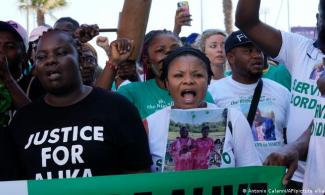
It was gathered that the deceased was a physically challenged Nigerian street vendor before he was brutally murdered by the Italian man who used the late Alika's crutches to beat him to death.
Following the death of a Nigerian migrant, Alika Ogochukwu, numerous Africans have emphasised the racism that people of African descent encounter regularly in Italy.
It was gathered that the deceased was a physically challenged Nigerian street vendor before he was brutally murdered by the Italian man who used the late Alika's crutches to beat him to death.
According to Kudus Adebayo, a fellow at the African Center for Migration and Society at the University of the Witwatersrand in South Africa, at the heart of Ogochukwu's murder is contempt for African life.
"Africans have been framed over the years as a burden to the European bliss," Adebayo told DW.
"Not just by the media but also by politicians who ride on the back of populist ideologies to seek votes and in the bid to do this, frame certain bodies as disposable.
"Not just someone that's having issues with a disability, but also a Black man who is on the street trying to make ends meet," he added.
According to those questioned for this piece, many Italians feel African immigrants are a burden on the country, bring sickness, and are to blame for rising crime rates.
Right-wing sympathisers have seized on this narrative and transformed it into an issue of immigration.
Africans in central and southern Italy who talked to DW on the condition of anonymity for fear of retaliation say the country has a racist crime problem that has never been acknowledged.
They claimed that high-level political discourse promotes violence, leading to attacks like the ones in Civitanova and other regions of the country.
A lot of Africans told DW that institutional racism exists in Italy.
"This problem holds a very notorious and uncomfortable position in that particular country," Adebayo said.
He went on to explain that it is simple for people with whatever notions they have in their brains to go out knowing they have the support of the state, 'to mete punishment' on people they believe shouldn't be in their country.'
"This is the pattern in Italy and it doesn't seem there is a very proactive approach to dealing with this issue in a very decisive manner."
Justin, a 45-year-old Nigerian vehicle expert in Civitanova, said racist remarks are occasionally hurled directly at black Africans' faces. At times, racial actions are disrespectful.
"Racism deprives us from competing equally, from learning the language, from being who we are," he told DW.
"We are being suppressed in different ways, we cannot even go to school, we are just mistreated," he added.
"They [Italian racists] give you this feeling everywhere that you are nothing. So, you have lots of fights and we are psychologically damaged and suppressed."
"We don't have equal rights here," Edewor said as he recalled some ugly personal experiences. "Somebody once told me: 'you are an ancient ape, get out of here; you're too dark.'"
He didn't end there. "They call you monkey, they call you names and, they ask what are you doing here; we don't need you here, you cannot do anything [about the racist attacks]."
So he ignored them because he wanted to acquire his [car mechanic] certificate. "I want to be successful, so I concentrated on myself."
Edewor said he understands the racist attacks: "They want to pull me down with all these words and some of these people sometimes come apologising because they see I'm really strong, even stronger than them."
Kennedy, 47, a delivery man who has lived in Parma, Italy, for the past 20 years, describes some Italians as pretentious people with plastic smiles on their faces but hearts full of venom.
"I have experienced a situation where I delivered electronics to a customer and she even offered me coffee, I accepted. When I left, she called the office that next time, they should not send a black man to her house again."
This was not the only experience. "When I brought in something to deliver to the house, she [another white Italian client] refused to open the door. She called the office that she was not expecting a black man to bring her stuff." The company told her that if she does not want to receive the package from a Black man, she had the right to reject the item, which she then did.
Omonigho, another Nigerian in Italy, told DW that she had been subjected to racist behaviour for the majority of her childhood.
Her father, an engineer, and mother, an African grocery shop owner, took her to a daycare centre in Cremona, Northern Italy, when she was two months old.
When the father would sometimes pass by to check on his baby, "they would take care of other children, maybe hold them. My daughter would be on the bed all alone in a hall," the father told DW. "Which is not supposed to be, but we don't have an alternative," he added. "Nobody wants to carry a black child."
Despite being born in Cremona, Italy, Omonigho has always felt undesired and unaccepted.
While non-African children who pooped on themselves in kindergarten were sent to the school cleaners and taught how to use the toilet, Omonigho was always told to go alone, while the cleaners refused to wash or teach her how to use a potty.